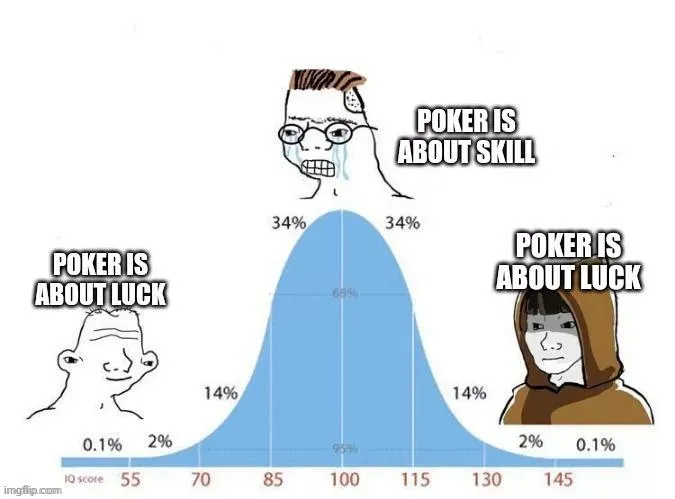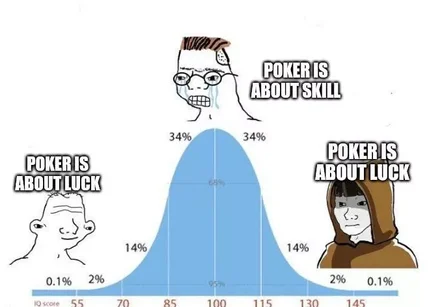Debunking Commonly Believed Myths About IQ
Spencer Greenberg
PhD in applied mathematics, expert in machine learning, and founder of a psychology research company.
In what ways do higher I.Q. people really differ from others, and what's merely a misconception about having a higher I.Q.?
Recently, I asked on social media, "What negative/bad traits do you think correlate with having a higher I.Q.?"
I was fascinated that I got such a large number of responses and that many of those responses are not actually true.
I took a look at our own data and some studies, and here are traits that commenters suggested were associated with a higher I.Q. that I believe are NOT ACTUALLY meaningfully higher among higher I.Q. people:
- Depression
- Anxiety
- Neuroticism (from the Big Five personality framework)
- Disagreebleness
- Impatience
- Laziness
- Addiction
There are also some traits that people mentioned that D.O. have some sort of relationship with I.Q., but the real relationship is complex, such as:
• Autism – more often than not, studies I've seen linked it to lower (not higher) overall I.Q., but it is sometimes associated with exceptional ability in specific tasks (which may lead to uneven scores across subtasks on I.Q. tests). For instance, some studies have found that people with autism perform better on Raven's Progressive Matrices relative to their performance on other I.Q. tasks. Raven's Matrices are a type of intelligence task where you have to say which symbol should fill in the blank spot to complete the pattern in a grid of symbols.
• Conscientiousness – some studies find that people with higher I.Q.s get lower scores on some aspects of the Big Five personality trait "conscientiousness." But the research is mixed. In a big study we ran, we found that mostly there wasn't much link, but there were some (small) negative correlations between I.Q. and some aspects of conscientiousness. In particular, higher I.Q. people were a bit *less* likely to agree that they "begin tasks right away" (r=-0.14), "are a workaholic" (r=-0.12), "don't stop until everything is perfect" (r=-0.16), and think that "laws should be strictly enforced" (r=-0.11).
• Emotional Intelligence (E.Q.) – in our research this cuts both ways. Higher I.Q. people performed better on a task we administered where they had to identify what emotion a person was experiencing based on an image of the person's face. However, high I.Q. people were also a bit less likely to agree with the statement "I express my feelings easily."
• Dark Triad-related traits like Machiavellianism, narcissism, and sadism – some studies find that these traits tend to be lower (not higher) in high I.Q. people, but the research is mixed. In our own study, we found Machiavellism was unrelated to I.Q., while narcissism and sadism were somewhat *lower* in higher I.Q. people (r=-0.15 and r=-0.27 when controlling for gender).
In a big study we ran (mostly on people in the U.S.), here are some traits we found to be positively correlated with I.Q. scores:
- The preference to sleep more hours per night (r=0.39) as well as how many hours they report sleeping weekly (r=0.33) – I have no idea why this is the case
- Thinking that profound sounding (but actually randomly generated) statements are *not* actually profound (e.g., "The unexplainable reflects universal knowledge")
- Less of an obsession with celebrities and feeling less of a bond with them (e.g., disagreeing that "If I met my favorite celebrity, and they asked me to do a favor for them, I would do it, even if it was illegal and dangerous." and disagreeing that "I am such a fan of my favorite celebrity that I think we share an indescribable bond between us.")
- Enjoying the act of thinking (linked to "need for cognition")
- Actively open-minded thinking (which involves being open-minded to viewpoints that contradict your own beliefs) and being accepting of people whose opinions you strongly disagree with, being able to express those opinions (e.g., being allowed to protest)
- Thinking that people are mostly good (r=0.20)
- Finding the world enticing or exciting (which is related to one of the big three "primal beliefs")
- Perhaps being a bit less charismatic in some ways (e.g., higher I.Q. is linked to being less likely to agree that "group activities tend to be dull without me" at r=-0.29, and "I am very charismatic" at r=-0.16)
- Being a bit more politically progressive and less spiritual and less religious
There are also some additional traits that I think are probably linked to higher I.Q. but I don't have data showing it, so these are more speculative.
In particular, I suspect that higher I.Q. people may have blind spots from the experience of feeling smart compared to their peers when growing up.
As Duncan Sabien put it:
"If you've spent your entire life being told you were wrong and being proven right (b/c you were smarter than the people around you), then when you run into another genius who tells you that you're wrong, you have a LOT of memetic antibodies that will make it easier-than-it-should-be to write them off or dismiss them."
I also suspect that some high I.Q. people learn to get by without making a big effort when they are young (e.g., excelling in school without really trying), which may lead to counterproductive beliefs in adulthood, such as that they don't need to try hard or that trying hard is a sign of not being smart.
Finally, I suspect that high I.Q. people tend to be more "in their heads" and less "embodied," though it's hard to know how to measure this or even how to precisely define it.
I hope this has helped deepen your understanding of what is linked to I.Q.

Is a High IQ Necessary in Poker?
This question is addressed by a 2015 study by two scientists at the Canadian University of Alberta (the same ones who used poker robots for Limit Hold'em and later No Limit Hold'em).
The aim of the project was to determine the personal qualities that significantly influence the level of poker skill. 100 people participated in the study, 82 of whom studied at the University of Lethbridge and 18 were local residents. 80% were white, 54 men and 46 women with an average age of 23.48 years, and received from the scientists from $0 to $100 depending on the skill demonstrated (they played poker against one of the university's robots).
It should especially be noted that the task was not to explore the nature of poker genius. They don't hire aliens like Ben Sulsky and Isaac Haxton for studies. The most important thing was to identify general trends.
After studying the data from the experiment, scientists came to the conclusion that a high general IQ has no effect, or practically no effect, on the level of poker playing. High intelligence was never mentioned as one of the attributes required by the best players. According to the study authors, having an average or slightly above-average IQ is probably all you need to be successful at poker.
Mathematical ability?
It was not possible to identify any link between counting ability and poker skill. Poker is considered a mathematical game, but the calculations required of players are generally quite simple and do not go beyond basic arithmetic.
Poker skill was most strongly associated with two factors:
1) the ability to resist typical errors in players' thinking
2) a good understanding of statistics.
Probabilistic intuition is innate, but this skill lends itself well to development. Basic calculation and understanding of how probability theory works in individual cases and in the long run can be considered essential qualities for a successful gambler.
Social skills?
One of the manifestations of social intelligence showed an average correlation with the level of poker play: the ability to read social information, that is, correctly interpret other people's behavior. The conclusions of the previous articles were confirmed: the strongest players are able to mentally simulate the behavior of their opponents and change their own strategy based on this. Other components of social intelligence did not influence the level of poker, so we can conclude that high social intelligence is not a necessary condition for a strong player.
Memory?
Zero. Short-term memory was tested and there was no correlation with poker level. As far as can be assessed, long-term memory was not assessed.
Personality traits?
For the vast majority of characteristics, no association was found. However, scientists discovered two traits whose presence significantly reduced the likelihood of being a high-level poker player. These terrible poker traits turned out to be a sense of beauty and a rich imagination. A poker player must be a practical realist who is not carried away by art or beauty. Perhaps this will help you to be less distracted from the game and maintain concentration for a long time.
The four best poker players in this study had the characteristics necessary for slightly above average (but never maximum) success. Considering that no strong correlations were found for any factor, we can conclude that a successful poker player must have a wide range of attributes; It's not enough to be a genius in one or two different aspects.






